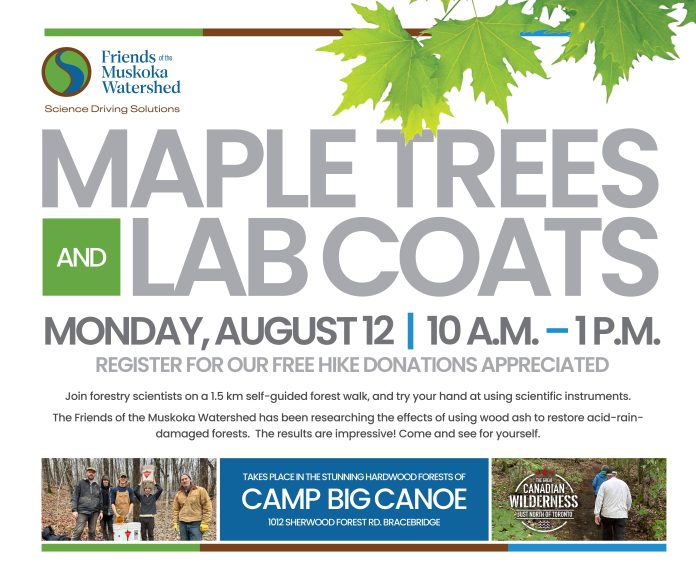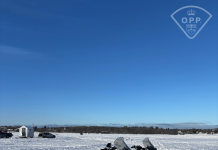Join Friends of the Muskoka Watershed for a free hike and learn how ash from woodstoves and fireplaces is restoring our forests.
Friends of the Muskoka Watershed is hosting a hike to let the community see and learn more about our successful ash addition research at Camp Big Canoe. Hear about it from the Trent University researchers who’ve been doing the research and monitoring. On Monday, Aug. 12, Camp Big Canoe in Bracebridge is welcoming guests to tour along Hart Lake and into the maple forests to learn more about Friends of the Muskoka Watershed’s (FOTMW) ASHMuskoka project.
“We’ve made it free so more people are able to learn about our work,” says FOTMW chair Lenore Inniss.
Muskoka’s lakes and forests are calcium deficient. It’s the impact of decades of acid rain on our shallow soil on the Canadian Shield. Wood ash, from fireplaces and woodstoves, is about 25 to 30 percent calcium and often disposed of as garbage in the landfill.
Instead, FOTMW has collected tons of ash from volunteers and, working with Trent University, studied the impact of adding it to forest soil.
The results are in. Just one dose makes the trees healthier, more disease-resistant, able to capture more carbon and, we believe, able to pump more water to lessen the impact of spring flooding.
“Applied research of this type is extremely rewarding. It connects the public to current environmental issues, shows that individuals can make a difference and allows students to feel that their work is valued by society,” says Dr. Shaun Watmough, director of the Environmental and Life Sciences and Graduate programs at Trent University.
“Having Friends of the Muskoka Watershed use our unused forests for research is a win-win situation for Camp Big Canoe,” says Doug Clark. “It makes our forests healthier, creates an opportunity for our campers and staff to learn, and FOTMW is acquiring knowledge that will positively impact forest health and climate change.”
Join us for a short 1.5 hike from 10 a.m. to noon. Use forest measurement tools including a densiometer to measure canopy cover and a dendrometer to measure tree trunk diameter growth. Then help restore the forest by spreading ash. Learn from experts including Dr. Norman Yan and researchers from Trent University.
On hand for the hike is Shelby Conquer, PhD student at Trent University, who has done much of the research so far at Camp Big Canoe.
“Sugar maple trees are a culturally and economically significant species in Canada but are increasingly threatened by climate change. Thus, studying ways to ensure their future health and survivorship is essential. By involving passionate members of our community we’ve not only been able to divert thousands of tons of wood ash from landfills, but we’ve been able to improve soil conditions to those that foster healthy sugar maple growths,” she says. “Hopefully, this will allow us to use the tools we have to preserve this species in the future.”
Following the short hike, meet on the deck of the camp dining hall for a Q & A period.
Enjoy exploring a maple forest, learn forestry skills, ask questions of researchers and get
an inside look at Camp Big Canoe at 1012 Sherwood Forest Rd in Bracebridge. Tickets are free, donations are appreciated, and registration is required online.
A second event, Peer Under the Surface, is a cruise planned for Sunday, Sept. 15 from 10 a.m. to noon. The cost is $65 and seating is limited to 42 participants. Check our website for more information.
Friends of the Muskoka Watershed is a charity with a focus on protecting Muskoka’s Watersheds forever. We research science-based solutions to environmental freshwater issues. Real Science takes real money. Donations are always appreciated, and tax receipts are issued.
Friends of the Muskoka Watershed is a charity focused on protecting Muskoka Watersheds forever with science-driven solutions. Click here to read our most recent scientific reports.








